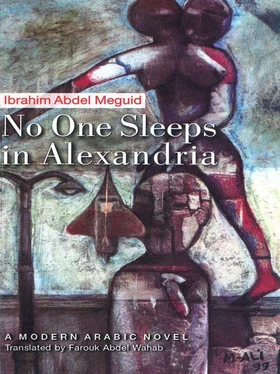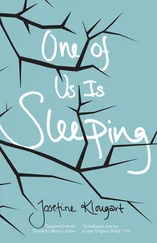For a week after, she did not go to school. She fell ill and had no will to move or eat. In the few moments that they were alone, Yvonne cried and told Camilla that she had pleaded with him to put an end to the relationship, to disappear from Camilla’s life. She told him, “You’re from northern Egypt, Rushdi — you don’t know what southern Egyptians are like. Besides, in this case it’s a compounded problem, a difference in religion, and violation of southern Egyptian customary behavior.” She asked Camilla to forgive her for her desperate action. Rushdi disappeared. He no longer stood in front of the school to wait for Camilla, who now started going more frequently to the school library to borrow the books of French poetry translated into English. She read Victor Hugo’s Les Misérables three times and memorized the streets of Paris, forgetting that that was a century and a half ago.
She soon recovered and laughed as she remembered how madly she had gone along with Rushdi. She also found that as soon as he disappeared, she was rid of any feeling of closeness with him. Was it the difference in religion that helped her to forget? He reappeared during exam period. She saw him waiting for her, holding a red carnation. He told her that after the exams he was going to his village, that his family was originally from the countryside. He also told her that he was sad that the Germans were attacking France viciously, that he was afraid that Paris might fall and Hitler would destroy it as he had destroyed Warsaw. Then he said, as if to himself, that Hitler could not destroy Paris; no one in the world could do that, even if they occupied it. Paris possessed a spiritual force that would stop the worst possible evil in the world; Paris had the power of beauty. He said he had come to say good-bye, to shake her hand quickly, as Yvonne was standing, tensely, at a distance. He apologized for any unease he had caused.
Camilla shook his hand. She remembered him only when Paris fell. She cried because she imagined him in his village, crying over the city that he loved. She had said she wished to visit Pans only because he had said that himself. Then she soon forgot everything. But she asked her mother to give her permission to learn French at the Berlitz School on Saad Zaghloul Street. The mother said she did not mind, on the condition that she went in the mornings, accompanied by Yvonne, who also wanted to learn the language.
When the foreign teacher was explaining the French verbs, she wrote ‘aimer’ on the board and, addressing one of the girls, she said, “Je t’aime.” Camilla found herself involuntarily repeating to herself, “Je l’aime.”
He said, “Sit on the throne and I will present everything to
you.” I did, and he presented
everything to me.
al-Niffari
Magd al-Din came back from work, as he did every day since he had started the new job, his hands stained with fuel oil, his back, arms, and legs exhausted, and aching all over. As usual he sat down on the bed, his feet dangling, as Zahra sat on the floor and pulled off his shoes and placed his feet in a small washbasin filled with hot water and salt.
“Are you going to bathe now?”
“Yes. Give me some kerosene, too, to clean my hands.”
She poured some kerosene from a can into a small jug and gave it to him. She also handed him a bar of soap and put the towel on his shoulder and his slippers outside the door of the room. The bathroom was in the hallway for common use. When the water from the shower hit the floor tiles, it was audible to all, but there was no way around it; he had to bathe, since he came back so dirty he could not stand his own skin. He could neither eat nor sleep until he had washed away all the day’s fatigue and dirt.
That day, like all other days, he had to dig into the hard earth under the old crossties, remove the old tracks and ties and, with his co-workers, install new ones — all for for more than one railroad line that needed maintenance or replace-ment. The many trains coming to the harbor left loaded with equipment and troops. The trains coming from Suez carried the African, Australian, and Indian soldiers of the empire all the way to the desert. The trains stopped in front of the pipe with the hose attached, next to which sat the silent man that he had seen the first day. There was an underground water reservoir to supply the steam locomotive; the pipe and the hose were connected to the reservoir, separated by a huge round knob that when turned would release water to the pipe and hose and ultimately to the locomotive. This whole apparatus was called ‘the Raven,’ no one knew why. As for the man sitting there, Hamza, Magd al-Din’s co-worker said he was an insane man who had planted the mulberry tree a long time ago and sat waiting for little birds that never came.
Magd al-Din and Dimyan saw their co-workers leave their jobs and approach every train as it stopped to get fuel and come back carrying little cardboard boxes filled with chocolates, tea, and cookies. The Indian soldiers, with big turbans and long rifles, were more generous than the others. Hamza said of them, “Even though the Indian soldier is Indian, he is smart. I tell him ‘English is good,’ and he says ‘Indian is very good’ and gives me more cookies.”
The workers would laugh at the way Hamza pronounced the English language and wondered where he had learned the many words he used with the soldiers. As soon as they moved away on the trains, Hamza would stand in the middle of the tracks and speak in verse:
The punishment meted out
To humans, big and small,
Is deserved. Many a sin and cruelty they commit
And the angels, they write it all down.
Then he would look at the cookies and the chocolate or whatever he had gotten and exclaim,
If it were just one worry I could handle it,
But I am assailed by three kinds of worries:
One inside, one outside, and
One at the door waiting for me.

The long iron rail is dislodged at a leisurely pace; it rises in a deliberately slow manner, tearing up the wooden flesh of the crossties, raising the long, spiral-shaped nails that leave behind deep round, glowing holes filled with splinters of wood. The rail elevates itself for a short distance then extends and expands, and out of it to one side come other, less thick rails that keep extend into space, shiny brown. Then they turn into large coils that quickly shrink but increase in number, as does the original rail. Then it rears its head and sticks out a forked tongue, stinging Magd al-Din’s leg. He leaps up, into space, but does not come down. He settles on the roof of a train hurtling forward at a crazy speed as the wind makes his hair fly and tears away his jacket, undershirt, and pants. He holds on fast to the train’s shiny roof, with nothing on except his underpants, but he slides down the side of the train and clings to the high edge and cries out, but no one can hear him. The train slows down gradually until it comes to a complete stop in the middle of two rows of people with unfamiliar features. They are laughing hysterically, ceaselessly and their bulging eyes never stop rolling. He falls in their midst. Some of them grab him and scrutinize him viciously, still laughing. The train keeps going, spewing its blue smoke. He sees Zahra in a panic behind the train, calling out to him, “Magd al-Din! Magd al-Din! Sheikh Magd!” while he is hoisted behind her on the hands of the people with strange faces and eyes, who are laughing ceaselessly and viciously. He screams, but his voice is lost in the hundreds of laughing faces. Zahra falls on the crossties and the fuel oil and turns back in pain, limping as the departing sun hurries to leave and the darkness hurries forth. The men with strange features leave him crouching in the dark, moaning faintly and long, feeling like an orphan. Then torrents of rain come down, with successive claps of thunder, as he shakes violently.
Читать дальше













